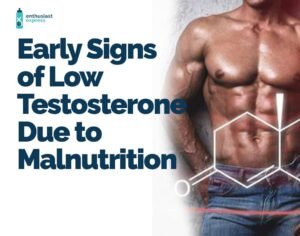Malnutrition affects testosterone levels in ways many men overlook, and this can cause a silent drain on your energy, confidence and vitality.
Did you know that what you eat could be the reason you’re always feeling tired, unmotivated, or less like yourself?
While testosterone is the driving force behind men’s strength, focus, and overall well-being, without proper nutrition, its production can take a serious hit.
In this article, we will explore how malnutrition impacts testosterone levels, the warning signs you should never ignore, and practical steps to boost your health.
By understanding how malnutrition affects testosterone levels, you will be better equipped to living a healthy life.
Lets dive in…
Malnutrition and how it relates to testosterone levels

Malnutrition is when your body isn’t getting enough nutrients to function properly.
It is not just about skipping meals, it is about missing essential vitamins and minerals your body needs to thrive.
Testosterone, the hormone that drives energy, muscle growth, and even your mood, depends on a balanced diet.
When you’re malnourished, your body struggles to produce this vital hormone, leaving you feeling weaker, less motivated, and often out of control of your body.
Below are the key nutrients your body needs to have to maintain a healthy production of testosterone.
Key Nutrients for Healthy Testosterone Levels
To keep testosterone levels in check, your body needs these specific nutrients:
1. Zinc:
Crucial for hormone production and maintaining healthy testosterone levels.
Found in foods like beef, shellfish, and pumpkin leaf.
2. Magnesium:
Boosts testosterone by supporting muscle recovery and energy production.
Sources include nuts, spinach, and whole grains.
3. Healthy Fats:
Essential for hormonal balance and overall health.
Found in avocados, eggs, and oily fish.
What happens when you’re deficient?

When your diet lacks these nutrients, testosterone levels drop, leading to various health issues and changes such as:
1. Physical Changes:
Fatigue, reduced muscle strength, and weight gain are common.
For example, relying too much on processed snacks instead of balanced meals can leave you feeling drained over time.
2. Emotional and Mental Effects:
Low testosterone can cause mood swings, irritability, and low libido.
For example, if you often skip meals or overeat too much on carbs, it will not only impact your body but your mental sharpness too.
Balancing your diet with the right nutrients is key to maintaining your testosterone and overall health.
How does malnutrition affects testosterone levels in African men?

There are several way malnutrition affects testosterone levels. Malnutrition poses unique challenges for African men due to cultural diets and lifestyle patterns.
Many African meals are heavy in carbohydrates, relying on staples like rice, yam, or fufu, while neglecting essential proteins and vegetables.
Busy work schedules or economic conditions often lead to skipped meals or reliance on processed foods, which lack the nutrients needed to maintain healthy testosterone levels.
Over time, these poor dietary habits weaken hormone production, leading to health issues that could have easily been avoided with better food choices.
Some of the poor eating habits common amongst African men include:
I. Skipping meals:
Many men skip breakfast or lunch due to demanding work schedules.
Imagine a man skipping breakfast and only eating at night, this can disrupt the nutrient balance in his body, lowering his testosterone over time.
II. Eating meals heavy in carbohydrates:
Dishes like yam or rice dominate plates as it is common, while proteins like fish or chicken are eaten in small portions.
For example a plate of fufu with minimal protein and no vegetables doesn’t meet testosterone-supporting nutrient needs.
Long-term impact on health and testosterone
I. Fatigue and reduced strength:
Low testosterone can result in reduced muscle mass and energy.
For instance, if you’re constantly feeling tired or struggling to lift weights when working out, this could be linked to poor nutrition.
II. Low libido:
Malnutrition can also decrease sexual drive and stamina. For example, eating poorly for years leaves the body too depleted to sustain any healthy testosterone levels.
Proper dietary balance is key to combating these challenges and maintaining vitality.
Early signs of low testosterone due to malnutrition

Low testosterone caused by malnutrition often sneaks up on men, showing subtle signs before they become serious.
These signs can include decreased energy, unexpected weight gain, mood swings, and low libido.
Imagine feeling drained after a regular day at work or struggling to maintain the energy to play with your kids or perhaps your waistline is expanding even though your eating habits haven’t drastically changed.
These aren’t just coincidences, they are your body’s way of signalling that something is wrong.
Some of these subtle signs include:
1. Physical signs
When testosterone levels drop due to poor nutrition, your body goes through noticeable changes that are hard to ignore. Examples are:
A. Muscle loss:
Testosterone helps to maintain muscle mass, and a lack of it weakens and shrinks the muscles over time.
For instance, you might notice your arms and legs looking thinner or feel weaker during tasks like carrying groceries or lifting a bucket of water.
This isn’t just “getting older”, it is your body telling you it lacks the right nutrients.
B. Unexplained weight gain:
Low testosterone causes the body to store fat, especially around the belly.
If you’ve started developing a potbelly even though you’re eating the same meals as before, it could be due to a hormonal imbalance linked to poor diet.
This is especially common when meals lack healthy proteins and include excess carbs.
C. Fatigue:
Constant tiredness is a sign of low testosterone caused by malnutrition.
Imagine feeling completely drained after waking up or needing three cups of coffee just to function during the day.
Fatigue like this is more than a busy lifestyle, it is a way of showing that your body isn’t getting enough nutrients to support healthy hormone production.
D. Hair thinning:
Testosterone plays a role in men’s hair growth, and when the levels drop, hair may thin or fall out.
You might notice more hair on your comb while brushing your hair or a patchy beard that doesn’t grow as full as it used to.
E. Reduced physical endurance:
Low testosterone reduces stamina, making even basic physical activities feel challenging.
For example, running after your child in the park or walking up a flight of stairs might leave you catching your breath.
2. Emotional and mental signs
Low testosterone affects not just your body but also your emotions and mental state. Some of the signs may present as:
I. Mood instability:
Fluctuating testosterone levels can cause mood swings, making you feel irritable or sad.
Imagine a man snapping at a co-worker over a minor mistake or feeling down for no reason. These changes often feel out of character and may cause frustration.
II. Lack of motivation:
This can reduce your drive to pursue goals or hobbies you once loved.
For instance, if you put away your guitar in a corner that you once loved playing or you haven’t gone to the gym in months, it could be because your energy and motivation are depleted.
III. Difficulty concentrating:
This can lead to mental fog, making it hard to focus or remember things.
As a man, you might find yourself forgetting where you left your keys or rereading the same email multiple times because it just doesn’t stick.
IV. Increased anxiety:
Testosterone impacts how you handle stress, and low levels can heighten feelings of unease or worry.
For example, you might feel nervous about routine activities like speaking in a meeting or planning a family trip.
Diet and lifestyle changes that support healthy testosterone levels

Improving your testosterone levels doesn’t require a complete change of your life, just small consistent changes can make a big difference.
What you eat, how you move, how well you sleep, and even how you manage stress all play crucial roles in boosting testosterone levels naturally.
These changes include:
Foods to add to your diet
I. Nuts:
Almonds and cashew nuts are rich in healthy fats and zinc, which are essential for hormone production.
For example, swapping chips for a handful of almonds as a snack can give your testosterone a boost.
II. Lean meats:
Chicken and turkey provide protein that supports muscle health and keeps testosterone levels steady.
III. Leafy greens:
Vegetables like spinach, cabbage and broccoli are packed with magnesium, which helps regulate testosterone.
Adding greens to your meals a few times a week can work wonders for your health.
Foods to avoid
I. Processed foods:
Packaged meals and junk food lack nutrients and can lead to weight gain, which lowers testosterone.
II. Sugary snacks:
Regular consumption of sugary drinks and sweets disrupts hormonal balance. For instance, swapping soda for water or fresh juice can help.
What’s the role of regular exercise on increasing testosterone levels?

- Exercises like squats, deadlifts, or push-ups stimulate testosterone production by engaging large muscle groups.
- Doing a quick home workout with resistance bands for example can help improve hormone levels.
- Excess body fat can reduce testosterone, so adding jogging or cycling helps burn calories.
- A 20-minute run three times a week can be a simple start to boost both fitness and testosterone.
The importance of stress management and sleep

-
Chronic stress raises cortisol, a hormone that lowers testosterone.
Techniques like deep breathing, yoga, or even taking a walk in nature can help reduce stress levels.
-
During deep sleep, your body produces most of its testosterone.
Aim for at least 7–8 hours of quality rest each night by creating a bedtime routine, like avoiding screens before bed.

Summary
Malnutrition affects testosterone levels in men and it can lead to fatigue, low libido, and other health issues.
Learn how to boost your testosterone naturally through diet, exercise, and lifestyle changes. Prioritize your health and reclaim your vitality.
With small, intentional changes, you can transform your energy, confidence, and overall health for the long haul.
At Enthusiast Express, we know how vital testosterone is to men’s energy, confidence, and overall health, and one of the ways we help to solve this problem is by educating men on how malnutrition affects testosterone levels.
However, you must take responibility over your own health. Taking steps to boost and balance testosterone is an investment in a healthier, more fulfilling life.
Subscribe to Enthusiast Express for expert advice on nutrition, fitness, and practical lifestyle changes to support healthy testosterone levels.
Join our community of men dedicated to better health, renewed strength, and thriving at every stage of life. Let’s build the best version of you—together!

